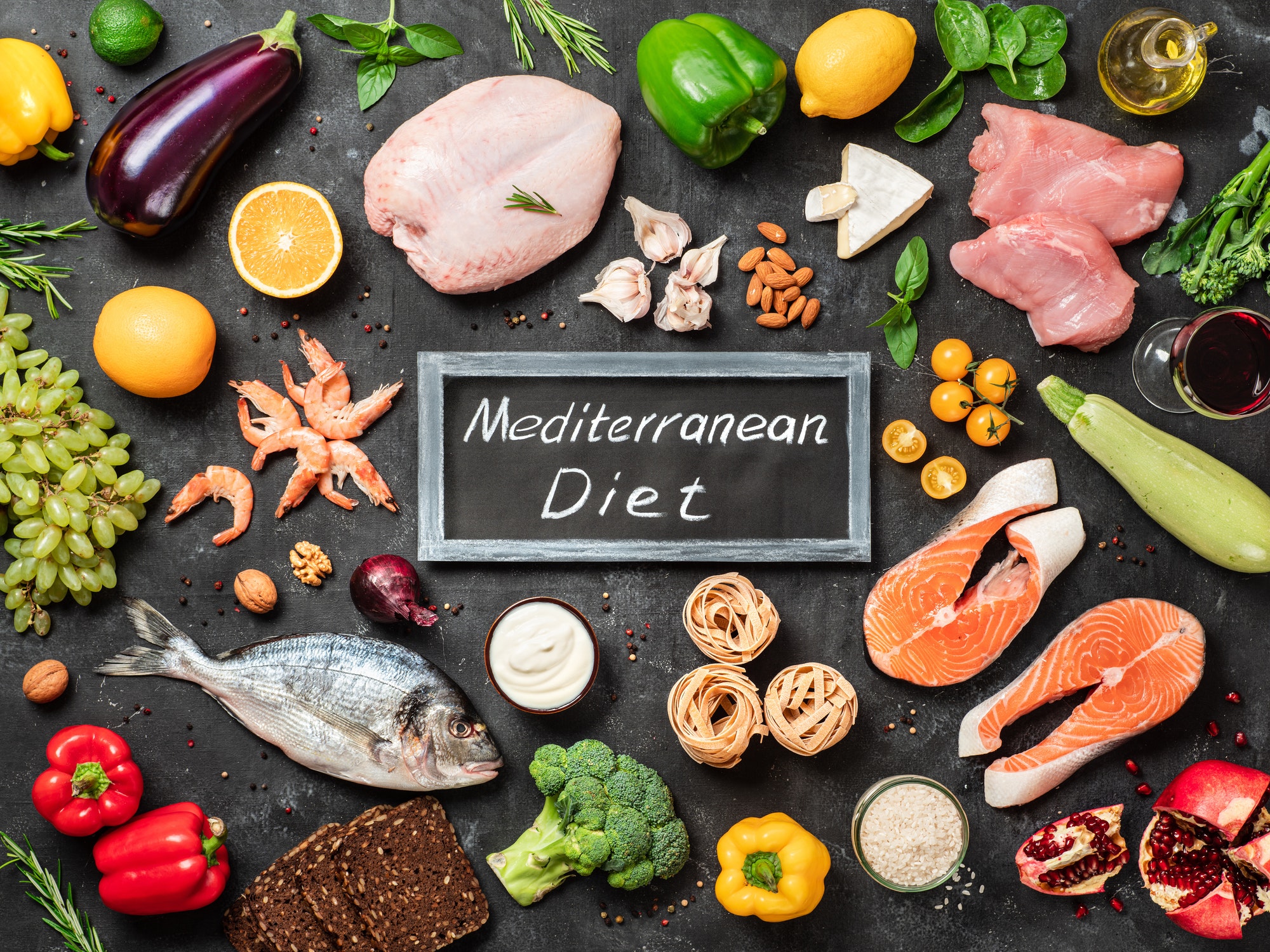How the Mediterranean Diet Can Boost Your Health and Happiness
If you are looking for a way to improve your health, well-being, and longevity, you might want to consider adopting the Mediterranean diet. This eating pattern, inspired by the traditional cuisines of countries bordering the Mediterranean Sea, has been shown to offer a range of benefits for your body and mind. In this post, I will explain what the Mediterranean diet is, what are its health benefits, and how you can start eating Mediterranean style today.What is the Mediterranean diet?
The Mediterranean diet is not a strict or rigid diet that tells you what to eat and what to avoid. Rather, it is a flexible and balanced way of eating that emphasizes whole, minimally processed, plant-based foods. It includes:
- Fruits and vegetables: These are the mainstay of the Mediterranean diet, providing vitamins, minerals, antioxidants, and fiber. You should aim to eat at least five servings of fruits and vegetables every day, preferably of different colors and varieties.
- Whole grains: These include whole-grain breads, pasta, rice, couscous, barley, oats, and other grains that have not been refined or stripped of their nutrients. Whole grains are rich in complex carbohydrates, fiber, and phytochemicals that can help lower blood sugar and cholesterol levels.
- Nuts and seeds: These are excellent sources of healthy fats, protein, fiber, and minerals. They can also help lower blood pressure and inflammation. You can enjoy a handful of nuts or seeds as a snack, or add them to salads, yogurt, or oatmeal.
- Legumes: These include beans, lentils, peas, chickpeas, and soybeans. They are high in protein, fiber, iron, and folate, and can help lower cholesterol and blood pressure. You can eat them as a main dish, such as in soups, stews, or curries, or as a side dish, such as in salads or hummus.
- Olive oil: This is the primary source of fat in the Mediterranean diet, and one of its key components. Olive oil is rich in monounsaturated fatty acids, which can help lower LDL (bad) cholesterol and raise HDL (good) cholesterol. It also contains antioxidants and anti-inflammatory compounds that can protect your cells from damage. You can use olive oil for cooking, dressing salads, or dipping bread.
- Fish and seafood: These are the main sources of animal protein in the Mediterranean diet, and are eaten several times a week. Fish and seafood are rich in omega-3 fatty acids, which can help prevent heart disease, stroke, and dementia. They also provide protein, iodine, selenium, and vitamin D. You can choose from a variety of fish and seafood, such as salmon, tuna, sardines, mackerel, shrimp, clams, or oysters.
- Dairy products: These include cheese, yogurt, and milk, and are eaten in moderate amounts. Dairy products are good sources of calcium, protein, and probiotics, which can support your bone health, muscle mass, and gut health. You can opt for low-fat or non-fat varieties, and choose natural or plain products over flavored or sweetened ones.
- Eggs: These are also eaten in moderation, and provide high-quality protein, iron, choline, and vitamin B12. Eggs can be part of a balanced breakfast, or used in dishes such as omelets, frittatas, or quiches.
- Poultry: This includes chicken, turkey, and other birds, and is eaten occasionally. Poultry is leaner than red meat, and provides protein, iron, zinc, and vitamin B6. You can choose skinless and boneless cuts, and cook them with herbs, spices, and olive oil.
- Red meat: This is eaten rarely, and in small portions. Red meat is high in saturated fat and cholesterol, which can increase your risk of heart disease and some cancers. You can limit your intake of red meat to once or twice a month, and choose lean cuts, such as sirloin, tenderloin, or round.
- Sweets: These include cakes, cookies, pastries, candies, and other desserts, and are eaten sparingly. Sweets are high in calories, sugar, and fat, which can contribute to weight gain, diabetes, and tooth decay. You can treat yourself to a small piece of dark chocolate, a piece of fruit, or a cup of herbal tea instead.
What are the health benefits of the Mediterranean diet?
The Mediterranean diet has been extensively researched and proven to have many health benefits. Some of the most notable ones are:
- Lower risk of cardiovascular disease: The Mediterranean diet can help prevent and treat heart disease, the leading cause of death worldwide. It can lower your blood pressure, cholesterol, triglycerides, and inflammation, and improve your blood vessel function and blood clotting. It can also reduce your risk of heart attack, stroke, and heart failure.
- Lower risk of diabetes: The Mediterranean diet can help prevent and manage type 2 diabetes, a chronic condition that affects your blood sugar levels. It can improve your insulin sensitivity, glucose tolerance, and glycemic control, and prevent or delay the complications of diabetes, such as nerve damage, kidney damage, and eye damage.
- Lower risk of cancer: The Mediterranean diet can help protect against various types of cancer, such as breast, colorectal, prostate, and stomach cancer. It can modulate your hormone levels, immune system, and gene expression, and inhibit the growth and spread of cancer cells. It can also reduce the oxidative stress and inflammation that can damage your DNA and trigger cancer.
- Lower risk of cognitive decline: The Mediterranean diet can help preserve your brain health and function, and prevent or delay the onset of dementia and Alzheimer's disease. It can enhance your memory, attention, and learning, and protect your brain from aging, atrophy, and amyloid plaques. It can also improve your mood and mental well-being, and reduce your risk of depression and anxiety.
- Lower risk of obesity: The Mediterranean diet can help you maintain a healthy weight and body composition, and prevent or treat obesity, a major risk factor for many chronic diseases. It can increase your satiety, metabolism, and thermogenesis, and decrease your appetite, hunger, and cravings. It can also improve your fat distribution and muscle mass, and prevent or reduce the accumulation of visceral fat, which is linked to metabolic syndrome and inflammation.
How to start eating Mediterranean style today?
If you are interested in adopting the Mediterranean diet, you don’t need to make drastic or sudden changes to your eating habits. You can start by making small and gradual adjustments, and incorporating more Mediterranean foods into your daily meals and snacks. Here are some tips to help you get started
- Eat more fruits and vegetables: Aim for at least five servings of fruits and vegetables per day, and choose a variety of colors and types. You can eat them raw, cooked, or roasted, and add them to salads, soups, sandwiches, or wraps. You can also snack on fresh or dried fruits, or make smoothies or juices.
- Switch to whole grains: Replace refined grains, such as white bread, white rice, and white pasta, with whole grains, such as whole-wheat bread, brown rice, and whole-wheat pasta. You can also try other grains, such as quinoa, bulgur, farro, or buckwheat. You can eat them as a main dish, or as a side dish, or use them to make porridge, granola, or muffins.
- Include nuts and seeds: Eat a handful of nuts or seeds every day, and choose unsalted and unroasted varieties. You can eat them as a snack, or add them to salads, yogurt, or oatmeal. You can also make your own nut butters, such as almond, peanut, or cashew butter, and spread them on bread, crackers, or fruit.
- Eat more legumes: Eat legumes at least twice a week, and choose from beans, lentils, peas, chickpeas, or soybeans. You can cook them from scratch, or use canned or frozen ones. You can eat them as a main dish, such as in soups, stews, or curries, or as a side dish, such as in salads or hummus.
- Use olive oil: Use extra virgin olive oil as your main source of fat, and use it for cooking, dressing salads, or dipping bread. You can also drizzle it over vegetables, fish, or cheese. Avoid using butter, margarine, or other oils that are high in saturated or trans fats.
- Eat more fish and seafood: Eat fish and seafood at least twice a week, and choose oily fish, such as salmon, tuna, sardines, mackerel, or herring, which are high in omega-3 fatty acids. You can bake, grill, or steam them, and season them with herbs, spices, lemon, or garlic. You can also eat shellfish, such as shrimp, clams, or oysters, which are high in protein and minerals.
- Eat some dairy: Eat dairy products in moderation, and choose low-fat or non-fat varieties. You can eat cheese, yogurt, or milk, and opt for natural or plain products over flavored or sweetened ones. You
Source(s)
- Why is the Mediterranean diet so good for you? - Mayo Clinic Diet
- Guide to the Mediterranean diet - Harvard Health
- Mediterranean Diet: Benefits, Food List And Meal Plans
- A practical guide to the Mediterranean diet - Harvard Health
- Mediterranean Diet 101: Meal Plan, Foods List, and Tips - Healthline

